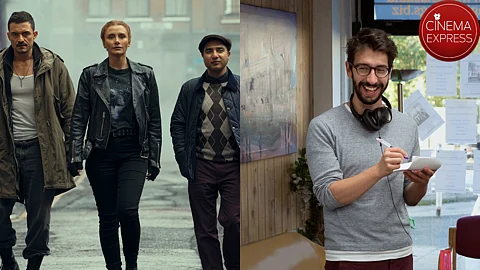

Director Tom Kingsley and producer Colin Trevorrow's action-comedy Deep Cover plunges audiences into London's gritty underworld with a potentially hilarious premise. The film stars Bryce Dallas Howard as an improv comedy teacher grappling with unrealised ambitions. Her life takes an unexpected turn when an undercover police officer, portrayed by Sean Bean, enlists her for a high-stakes mission. Kat then recruits two of her unsuspecting students, played by Orlando Bloom and Nick Mohammed, to impersonate dangerous criminals and infiltrate a ruthless gangland. This unique blend of genres and a stellar cast promises a thrilling and comedic ride.
Ahead of the film's release on June 12 on Prime Video, Kingsley spoke to us about its genre, collaborating with co-writers Ben Ashenden and Alexander Owen and producer Trevorrow, the London setting's influence, and more.
Deep Cover appears to be a unique blend of action, comedy, and improv. Given your background in comedy, were there specific moments where the comedic impulses had to be reined in for the sake of the action or vice-versa?
For Deep Cover to truly work, audiences should believe in the high-stakes situations the characters find themselves in. While I wanted it to be as funny as possible, there was a fine line where too much silliness could undermine the credibility of the situation. The best example is the film's climax, where police officers—played by writers Ben Ashenden and Alex Owen—are in a surveillance van. They delivered an incredible five-minute take with hilarious, plot-relevant lines. In the edit, it was a delicate balance: two jokes weren't quite enough, and four made the characters seem unserious. So, naturally, we landed on three.
The script has been co-written by a team including yourself and British improv duo Ben Ashenden and Alexander Owen. Could you elaborate on the collaborative writing process and how the improv background of some writers influenced the story and dialogue?
All of us love improvisation, and a lot of my TV work does have improvisation in it. However, we're not from improv comedy backgrounds ourselves. Ben and Alex are incredible writers. That's why we didn't need much on-set improv. That said, Ian McShane did improvise a line that was so helpful to the story it's actually in the movie trailer. Surprisingly, the main thing in the movie that was improvised was the soundtrack. Our incredible composer Daniel Pemberton assembled an amazing team of musicians for two one-hour sessions, and they jammed, improvising the majority of the score.
How did the London setting influence your directorial choices? Did you aim to portray a familiar London or one that feels somewhat heightened or stylised for the comedic action?
The film's comedy stems from the tension of incompetent characters in genuinely dangerous situations. Thus, our locations had to feel utterly real to maintain believability. It was crucial to portray an authentic London, not a staged studio or a picturesque postcard version. To ground the comedy in reality, we sought out-of-the-way places with dirt and graffiti. The film's aesthetic also owes much to the cinematography: our characters are thrown so far out of their normal lives that they feel like they're in a blockbuster. We aimed to emulate the gorgeous cinematography of classic '80s Tony Scott action movies, complete with lens flares, striking contrast, and epic long-lens shots.
The film explores the idea of these characters "taking their talent too far". How did you work with the actors to delve into the psychological aspects of blurring the line between their improv personas and their undercover identities? Was there a particular scene or character arc where this tension was most acutely explored?
Orlando Bloom’s character, Marlon, is an intense method actor who refuses to break character. Before filming, I had a very long Zoom call with Orlando, where we went through every line, deciphering whether he was speaking as Marlon the actor or as the criminal persona Marlon had invented. Orlando was incredibly skilled at snapping in and out of character—sometimes mid-sentence. I'm so impressed with his performance in this movie and can't wait for the world to see how funny he is.
You have a distinct comedic voice. How did you and your producer foster an environment that allowed both of you to bring your unique visions to Deep Cover. What was the collaborative dynamic like in melding your respective strengths?
My Director of Photography and I carefully planned all the action sequences. We'd then bring our plans to Colin (Trevorrow) for his input and approval. Colin has made some of the biggest movies of all time, making him the perfect person to suggest things we might have missed or techniques he's used successfully in the past. These were very specific insights I'd never have known otherwise—for instance, filming a motorbike chase at a higher frame rate to make it appear faster, or moving the camera opposite a speeding car to heighten its energy. Colin was incredibly trusting and supportive. I was very lucky to have his expertise on those action sequences, and in return, I could protect and enhance everything that makes this a great British comedy film.